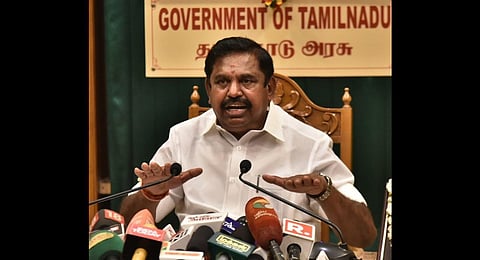

CHENNAI: Following recent protests from members of the Vanniyar community led by alliance partner PMK, seeking a compartmental quota, the AIADMK government in Tamil Nadu on Friday passed a Bill temporarily providing an internal reservation of 10.5 per cent to the community under the category Most Backward Classes (V).
The Bill provides special reservation of seats for members of the Vanniyakula Kshatriya (the common name of the community) in educational institutions, including private educational institutions, in State appointments or posts in the services under the State, in Tamil Nadu within the 20 per cent reservation for Most Backward Classes and Denotified communities. The Bill was introduced in the Assembly by Chief Minister Edappadi K Palaniswami and passed shortly before the notification of election dates for the State. Learning of the move, PMK founder, who has been raising the demand for nearly three decades, telephoned Palaniswami and he thanked him for acceding to the demand. Indeed, the Bill is a culmination of four-decades of campaigning that, at times, turned violent.
Introducing the Bill in the Assembly, Palaniswami had noted that there had been consistent demands from the Most Backward Class of Vanniyakula Kshatriya to provide a separate reservation for them in admission to such educational institutions and appointments or posts in the services under the State as they could not compete with the other castes and communities included to avail such benefits.
He said that under the Tamil Nadu Backward Classes, Scheduled Castes and Scheduled Tribes (Reservation of seats in educational institutions and of appointments or posts in services under the State) Act of 1993 (Tamil Nadu Act of 45 of 1994), these communities were availing a reservation of 30 and 20 per cent, respectively, in admission to educational institutions, including private educational institutions, and appointments or posts in the services under the State.
“The chairman of the Tamil Nadu Backward Classes Commission examined the demand made by various communities to provide for internal reservation within the quota for Most Backward Class and Denotified Communities under various categories,” he said.
The commission, the CM said, had recommended that internal reservation may be given for three categories: An internal quota of 10.5 per cent may be given to the Most Backward class (V), while the Most Backward Classes and Denotified Communities may be given an internal quota of 7 per cent and Most Backward Classes 2.5 per cent to provide them better access to various benefits and promote equitable development of the communities in Tamil Nadu.
“The government has decided to accept the commission’s recommendation and implement the reservation policy accordingly,” Palaniswami said.
“The internal reservation has been offered temporarily and work has commenced to conduct a caste-wise census within six months. The reservation given now will change based on the findings of the census,” he added.
According to the Bill, the category of MBC(V) will include the Vanniyar, Vanniya, Vannia Gounder, Gounder or Kander, Padayachi, Palli and Agnikula Kshatriya sub-castes that come under the Vanniyakula Kshatriya community. They will enjoy 10.5 per cent of internal reservation while 25 castes under MBC and 68 castes under Denotified Communities (93 in all), will be allocated a reservation of seven per cent. Besides, the remaining 22 castes have been categorized under MBC and will enjoy 2.5 per cent of internal reservation.
The Bill was unanimously adopted by voice vote in the Assembly since the opposition parties had boycotted the session.
Ramadoss said that he was happy that his dream of four decades had witnessed its “first phase of victory” and thanked Deputy Chief Minister O Panneerselvam, law minister CVe Shanmugam and others.
In the early 1980s, it was Ramadoss who led 10 Vanniyar caste associations under the banner of the Vanniyar Sangam to press for the demand. In September 1987, the issue captured widespread attention after the Sangam embarked on a road blockade in the northern districts completely paralysing transport. In the police action against the protesters, 21 persons were killed.
Subsequently, the then MGR-led AIADMK government convened a meeting with leaders of all communities. But before a decision could be taken, MGR died in December 1987 and the AIADMK government fell within a month. When the DMK came to power in the next election, the M Karunanidhi-led government introduced a 20 per cent reservation to 108 communities, including the Vanniyars, under the new category of Most Backward Class and Denotified Communities (MBC and DNC) by dividing the Backward Classes quota.
Based on the success of this protest, Ramadoss floated the PMK, commanding the support of the Vanniyar community. In recent elections, the party has consistently garnered a vote share of around 5 per cent, making it a valuable alliance partner to the Dravidian majors. However, Ramadoss raised the demand for an exclusive quota for Vanniyars, claiming they were not receiving adequate representation under the MBC reservation.
This issue came to the limelight again in December 2020 when PMK cadres staged protests, including blocking of trains. Following this the Tamil Nadu government constituted a commission headed by retired judge A Kulasekaran to collect quantifiable data on castes, communities and tribes.
However, other Backward Class caste groups also started demanding an exclusive reservation, complicating matters. DMK criticised the PMK’s campaign by pointing out that it had made the same offer of internal reservation within the MBC quota to the PMK earlier, but the party had rejected it at the time.
The complexity of the issue became more evident when even hours after the Bill was passed on Friday, only the PMK and CPM party commented on the move. CPM State secretary K Balakrishnan termed the Bill as one passed purely for short-term political mileage. “If they have a genuine intention they should have done it well ahead (of the elections) after convening an all-party meeting and getting approval from all. Their hurried passing of the Bill clearly shows they were seeking short-time political mileage,” he said.